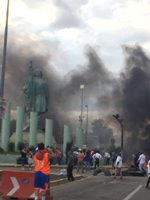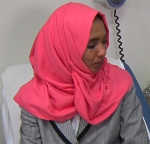Published on Wed, 2016-06-22 10:37
Recent austerity policies are undermining economic, social and labour rights within the European Union (EU) and are hitting the most vulnerable, the United Nations Independent Expert on the effects of foreign debt and human rights, Mr Juan Pablo Bohoslavsky, has said. This conclusion was highlighted in an end-of-mission statement following his recent official visit to EU institutions to assess the response of these institutions and of EU Member States "to the sovereign debt and financial crisis from a human rights perspective." |
Published on Tue, 2016-06-21 14:46
Last June 19th, we have been witnesses of the extremely violent actions of the Mexican State repressing the teachers and the organized civil society in resistance in different areas of the State of Oaxaca including the Istmus of Tehuantepec, Nochixtlán and the city of Oaxaca. As a result of the excessive use of force, at least six persons have lost their lives and dozens have been injured and arrested. At this moment there is no information about the whereabouts of the arrested persons neither there is an exact total number of injured and killed persons. Medical attention was not guaranteed and civil society had to create points of emergency medical attention to injured persons without being able to cope with the demand. There are happening particularly violent actions in the city of Oaxaca tonight. We have witnessed the arrival of a large number of airplanes of the Federal Police and the Gendarmerie in the city throughout the day as well as we witness that the tension is increasing every minute. |
Published on Fri, 2016-06-10 17:26
Malta will hold the Presidency of the European Union in the first half of 2017 and it should practice what it preaches, argues the Maltese NGO Kopin, "by ending European agricultural subsidies and other unjust practices that are harming and keeping poor undeveloped countries from reaching their potential". Justice and dignity for Maltese citizens cannot be separated from that of all citizens around the world and therefore the role of Malta as tax haven should be revised, since "tax evasion and money laundering are two major causes of global poverty and injustice". Further, the Mediterranean island should do more towards the integration of migrants, combatting xenophobia and "putting special emphasis on the rights of children and youth who are migrating, irrespective of their reasons to move". |
Published on Fri, 2016-06-10 17:15
Jordan is a middle income country, but the consequences of the global economic crisis and the massive influx of Syrian refugees are enormous challenges. Despite some progress in achieving the MDGs, little was made on goals that required structural change, harmony among policies, continuity and sustainability of funding–notably the targets on employment and environmental sustainability. The country is not receiving adequate international support to host 1.3 million Syrians (one for every five Jordanians) which together with a fast growing population impose stress on social services and water provision. Yet, for civil society "the main challenge is lack of good governance". |
Published on Fri, 2016-06-10 15:11
Since the 1990s, when democracy was reinstated, Bangladesh has been able to make some extraordinary achievements. The poverty rate was 57 percent in 1991 and was reduced to 31.5 percent in 2010, enrolment in primary education reached 98 per cent and girls slightly outnumber boys in schools. But budget allocations to health and social security are far from enough, corruption and illicit financial flows divert resources and climate change is set to produce more physical damage in Bangladesh by 2025 than in any other country. Rising sea levels, severe storms and other extreme climate-related events are going to produce millions of "climate refugees" in a country that has not contributed to generate this phenomenon and is not receiving compensation for enormous loss and damages. |
SUSCRIBE TO OUR NEWSLETTER







